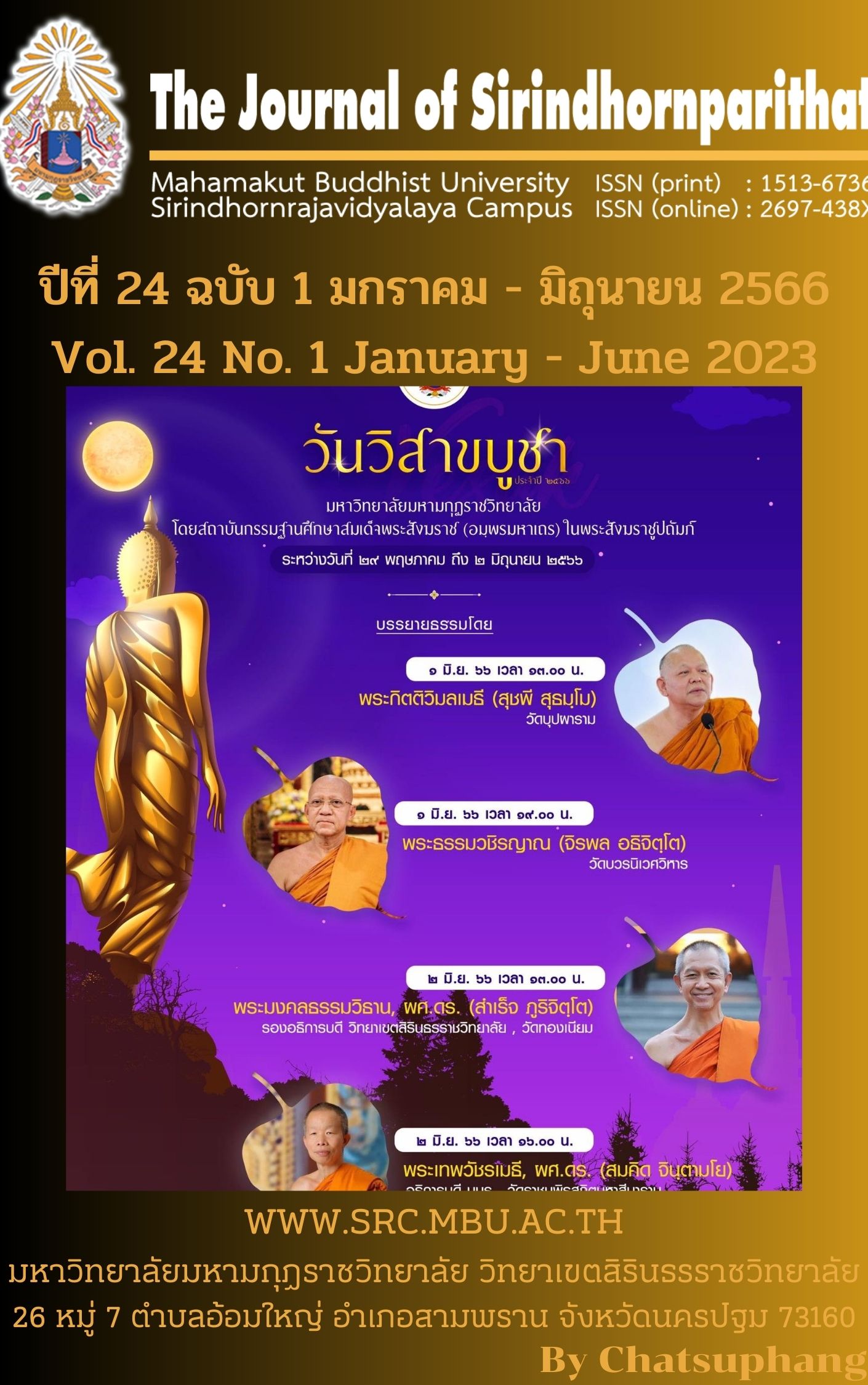The Factors Affecting Schools As Learning Organizations Under Chonburi Primary Educational Service Area Office 2
Keywords:
learning organization, statistical significance, educational institutionsAbstract
Aims of research were to 1) the level of factors leadership, organizational culture, the atmosphere, the persuasion, and the structure of organization of schools; 2) the level of Learning organization of schools; 3) The relationship between factors studies as learning organizations of schools; and 4) The factors affecting schools under office of Chonburi primary education service area. The samples consisted of 302 obtained by random teachers under office of Chonburi primary education service area 2. The instrument for collecting data was a questionnaire. The statistic used for data analysis were mean, standard deviation, Pearson's product moment correlation coefficient, and multiple regression analysis. The research result were as follows; 1) The factors leadership, organizational culture, the atmosphere, the persuasion, and the structure of organization overall was at the hight level. 2) Learning organization of school under Chonburi primary educational service area office 2 mental model, the personal mastery, team learning, system thinking and the share vision overall was at the hight level. 3) The relationship between leadership, the persuasion, the structure of organization, organizational culture, and the atmosphere that supports learning aspect under office of Chonburi primary education service area 2 had the highest positive with the statistical significance of .05. and 4) The factors in the atmosphere, organizational culture, the persuasion and the structure of organization affecting learning organization of schools under office of Chonburi primary education service area 2 with the statistical significance of .05. They could concurrently predict the learning organization at 84.60 percent.
References
กชนันท์ ศุขนิคม. (2562). ปัจจัยที่ส่งผลต่อการเป็นองค์การแห่งการเรียนรู้ของสำนักงานคณะกรรมการส่งเสริมการศึกษาเอกชน. ปริญญาครุศาสตรมหาบัณฑิต. สาขาวิชาการบริหารการศึกษา มหาวิทยาลัยราชภัฏสวนสุนันทา.
บุญชม ศรีสะอาด และบุญส่ง นิลแก้ว. (2535). การวิจัยเบื้องต้น. (พิมพ์ครั้งที่6). มหาสารคาม: มหาวิทยาลัยศรีนครินทรวิโรฒ.
เปรมศิริ เนื้อเย็น. (2556). ปัจจัยที่ส่งผลต่อการเป็นองค์การแห่งการเรียนรู้ของสถานศึกษา สังกัดสำนักงานเขตพื้นที่การศึกษาประถมศึกษาเพชรบุรี เขต 2. วิทยานิพนธ์ครุศาสตรมหาบัณฑิต สาขาวิชาการบริหารการศึกษา มหาวิทยาลัยราชภัฏเพชรบุรี.
พรรษา ไพรเลิศ. (2557). ปัจจัยการบริหารที่ส่งผลต่อการเป็นองค์การแห่งการเรียนรู้ของสถานศึกษา สังกัดสำนักงานเขตพื้นที่การศึกษาประถมศึกษาปราจีนบุรี เขต 1. วิทยานิพนธ์ครุศาสตรมหาบัณฑิต สาขาวิชาการบริหารการศึกษา มหาวิทยาลัยราชภัฏราชนครินทร์.
พิณสุดา สิริธรังศรี. (2555). การรู้สารสนเทศและกลไกการเรียนรู้ในยุคโลกาภิวัฒน์. ปริญญาครุศาสตรมหาบัณฑิต. สาขาวิชาการบริหาร มหาวิทยาลัยธุรกิจบัณฑิตย์.
ราชกิจจานุเบกษา. (2546). พระราชกฤษฎีกาว่าด้วย หลักเกณฑ์และวิธีการบริหารกิจการบ้านเมืองที่ดี พ.ศ. 2546. เล่ม 120/ตอนที่ 100ก/หน้า 1/9 ตุลาคม 2546.
รูสนานี ยาโม. (2555). ปัจจัยการบริหารที่ส่งผลต่อสภาพการเป็นองค์การแห่งการเรียนรู้ของสถานศึกษาในสามจังหวัดชายแดน. ปริญญาศึกษาศาสตรมหาบัณฑิต. สาขาวิชาการบริหารการศึกษา มหาวิทยาลัยสงขลานครินทร์.
วรรณะ บุษบา. (2553). ปัจจัยที่ส่งผลต่อการเป็นองค์การแห่งการเรียนรู้ของสถานศึกษาสังกัดสำนักงานคณะกรรมการการศึกษาขั้นพื้นฐาน. ปรัชญาดุษฎีบัณฑิต. สาขาการบริหารการศึกษา. มหาวิทยาลัยสยาม.
สันติธร ภูริภักดี. (2563). การเป็นองค์การแห่งการเรียนรู้ [ออนไลน์]. เข้าถึงข้อมูล วันที่ 30 พฤศจิกายน 2563. จาก www.tci-thaijo.org.
สำนักงานเขตพื้นที่การศึกษาประถมศึกษาชลบุรี เขต 2. (2563). สารสนเทศทางการศึกษา. ชลบุรี: สำนักงานเขตพื้นที่การศึกษาประถมศึกษาชลบุรี เขต 2.
สำนักงานคณะกรรมการพัฒนาการเศรษฐกิจและสังคมแห่งชาติ. (2562). ยุทธศาสตร์ชาติ (พ.ศ. 2561-2580). กรุงเทพฯ: พิมพลักษณ์.
สำนักงานปลัดกระทรวงศึกษาธิการ. (2560). แผนปฏิบัติราชการประจำปีงบประมาณ พ.ศ. 2560. ชลบุรี: สำนักงานปลัดกระทรวงศึกษาธิการ.
สุภาวดี ลาภเจริญ. (2561). ปัจจัยการบริหารที่ส่งผลต่อการเป็นองค์การแห่งการเรียนรู้ของโรงเรียนสาธิตมหาวิทยาลัยรามคำแหง. วิทยานิพนธ์ศึกษาศาสตรมหาบัณฑิต สาขาวิชาบริหารการศึกษา มหาวิทยาลัยเกษตรศาสตร์.
Avolio, J. & Bernard M. (1999). ‘Transformational Leadership, Charisma, and Beyond’. In J.G., Hunt et al. (Eds.) Emerging Leadership vistas. Lexington Books.
Best, J. W. & Khan, J. V. (1993). Research in Education (7th ed.). Boston: Allyn Bacon. Cengage Learning International Student Edition.
Goh M. and Pinaikul P. (1998). “Logistics management practices and development in Thailand.” Logistics Information Management 11, 6: 359-369.
Hoy, W. & Miskel, C. (2001). Educational Administration: Theory, Research and Practice (6th ed.). New York: McGraw-Hill.
Krejcie, R. V., & Morgan, D. W. (1970). Determination sample size for research activities. Education and Psychology Measurement.
Reece, P. D. (2004). Universities as Learning Organizations: How can Australian Universities become Learning Organization?. Unpublished Doctoral Dissertation, Murdoch University.
Senge, P. M. (1990). The Fifth Discipline: The Art and Practice of the Learning. Organization. New York: Doubleday.
Senge, P. M. (2000). The fifth discipline: The art and practice of the learning organization, London: Random House.

Downloads
Published
Issue
Section
License
Copyright (c) 2023 Mahamakut Buddhist University

This work is licensed under a Creative Commons Attribution-NonCommercial-NoDerivatives 4.0 International License.
บทความที่ได้รับการตีพิมพ์เป็นลิขสิทธิ์ของ มหาวิทยาลัยมหามกุฏราชวิทยาลัย วิทยาเขตสิรินธรราชวิทยาลัย
ข้อความที่ปรากฏในบทความแต่ละเรื่องในวารสารวิชาการเล่มนี้เป็นความคิดเห็นส่วนตัวของผู้เขียนแต่ละท่านไม่เกี่ยวข้องกับหาวิทยาลัยมหามกุฏราชวิทยาลัย วิทยาเขตสิรินธรราชวิทยาลัย และคณาจารย์ท่านอื่นๆในมหาวิทยาลัยฯ แต่อย่างใด ความรับผิดชอบองค์ประกอบทั้งหมดของบทความแต่ละเรื่องเป็นของผู้เขียนแต่ละท่าน หากมีความผิดพลาดใดๆ ผู้เขียนแต่ละท่านจะรับผิดชอบบทความของตนเองแต่ผู้เดียว



